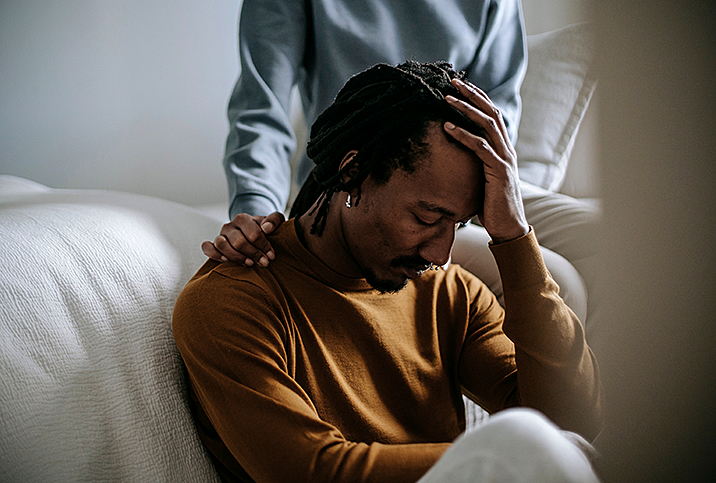What Are the Sexual Side Effects of Parkinson's Disease?

Nearly 1 million Americans live with Parkinson's disease, a central nervous system disorder that affects movement. Sexual problems frequently occur in anyone who has Parkinson's. This may be due to the disease's physical effects, such as coordination and movement, or the associated mood issues, such as depression and anxiety.
According to a 2020 study published in the Journal of Sexual Medicine, people with Parkinson's rate sexual dysfunction as their 12th most bothersome symptom. A small study published in the Journal of Sex & Marital Therapy found that 41.9 percent of men and 28.2 percent of women sometimes refrained from sex after being diagnosed with Parkinson's.
It's important to note that Parkinson's does not affect everyone's sexual functioning. While some couples experience problems, many do not. One study found that sex may actually help improve the health of a Parkinson's patient. The two-year study published in the European Journal of Neurology tracked the sexual habits of 355 Parkinson's patients.
The researchers concluded that early-stage male patients who were sexually active experienced milder Parkinson's disease progression, a less drastic loss of motor skills and less depression; they also had a better overall quality of life than those who did not have sex. However, the findings appeared to only apply to men.
Parkinson's & sex
Parkinson's can cause the following sexual symptoms:
- Impaired sexual coordination. Muscle tremors, slow movements and rigidity can impact an individual's ability to have sex. The physical pain associated with Parkinson's symptoms can make sex uncomfortable or even painful.
- Loss of lubrication and frequent urination. Some women with Parkinson's experience vaginal dryness and involuntary urination during sex.
- Lack of orgasm. Both men and women with Parkinson's may not be able to climax during sex.
Parkinson's & erectile dysfunction
Erectile dysfunction (ED) is one of the most common sexual problems for men with Parkinson's. Because the disease impacts the central nervous system, which constitutes the brain and spinal cord, men with Parkinson's may find it difficult to achieve or maintain an erection. Those with Parkinson's who take ED medications need to do so with caution; they may experience a dramatic drop in blood pressure, which can be dangerous because Parkinson's already tends to cause low blood pressure.
Depression is sometimes both the result and cause of ED, so treating depression may actually help ED. Ask your doctor about medications to treat depression that do not lessen your sex drive, as some antidepressants are known to.
Sexual side effects of medications
Some people with Parkinson's experience a dramatic increase in sexual interest after taking certain medications; they may even find it difficult to control their sexual impulses. If you notice you have trouble controlling your impulses, tell your doctor because they may need to adjust your dosage. Most impulse-control issues will go away once the dosage is reduced.
Sex tips from people with Parkinson's
The sexual complications that come with Parkinson's can be overwhelming. If you have Parkinson's and are sexually active, consider the following strategies:
- Plan sex for when movement symptoms are at a minimum.
- Apply lubricants to lessen the effects of tremors on the skin.
- Exercise to improve your stamina and mobility. This also may enhance hormone levels.
- Physical therapy may help your mobility.
- Have sex in ways that minimize movements between positions.
- Use satin sheets to ease movement.
- The problem could be the dose of medication you are taking. Talk with your doctor about adjusting the dosage.
- Reduce stress and any burden on your partner.
- Seek psychotherapy. It may be helpful to talk through your fears, worries and anxieties. Overcoming these negative feelings might allow you to more fully enjoy sex with your partner.
- Communicate with your partner. Let them know how you feel and what you are going through.
If you or someone you love is suffering from adverse sexual side effects due to Parkinson's or its medications, you are not alone. Let your doctor know all the symptoms you are experiencing. A medical professional can adjust your medication or add or reduce treatments; they can also refer you to a specialist.
Sexual health is an essential part of your life, no matter what condition you have, so it's critical to seek help for your sexual needs.


















